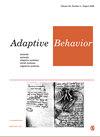Suffering and sense of self: The tension between reflection and experience—The case of depression
IF 1.3
4区 计算机科学
Q4 COMPUTER SCIENCE, ARTIFICIAL INTELLIGENCE
引用次数: 1
Abstract
The tension between reflection and experience has been highlighted by Buddhism as the origin of human suffering, described as an undercurrent and constant feelings of restlessness, grasping, anxiety, and dissatisfaction or disease. This universal suffering experience called Dukkha refers to the failure to find a Self in reflection or the frustrated desire or craving to have or to be something. For Buddhism, not only the desired object is illusory, but so is the desiring self. Further, Varela et al. (1993) integrate these ideas into the development of cognitive sciences and the understanding of human experience from an embodied and selfless mind perspective. The present article attempts to apply the Buddhist notion of suffering or Dukkha along with Varela, Thompson, and Rosch’s contributions to the understanding of the embodied sense of Self that characterizes symptoms of Depression. The expression of the self-grasping suffering experiences and the tension between reflection and experience for depressive patients will be discussed from an enacted and embodied perspective. Further, new research ideas along with possible new psychotherapeutic approaches are discussed.痛苦与自我意识:反思与体验之间的张力——以抑郁症为例
佛教强调反思和经验之间的紧张关系是人类痛苦的根源,它被描述为一种潜流和持续的不安、执著、焦虑、不满或疾病的感觉。这种普遍的痛苦体验被称为苦(Dukkha),指的是无法在反思中找到自我,或者对拥有或成为某种东西的欲望或渴望受挫。对佛教来说,不仅欲望的对象是虚幻的,欲望的自我也是虚幻的。此外,Varela等人(1993)将这些观点整合到认知科学的发展中,并从具身和无私的心灵角度理解人类经验。本文试图运用佛教的苦或苦的概念,以及Varela, Thompson和Rosch对抑郁症症状特征的自我体现感的理解的贡献。从制定与具身的角度探讨抑郁症患者对自我把握的痛苦体验的表达以及反思与体验之间的张力。此外,还讨论了新的研究思路以及可能的新的心理治疗方法。
本文章由计算机程序翻译,如有差异,请以英文原文为准。
求助全文
约1分钟内获得全文
求助全文
来源期刊

Adaptive Behavior
工程技术-计算机:人工智能
CiteScore
4.30
自引率
18.80%
发文量
34
审稿时长
>12 weeks
期刊介绍:
_Adaptive Behavior_ publishes articles on adaptive behaviour in living organisms and autonomous artificial systems. The official journal of the _International Society of Adaptive Behavior_, _Adaptive Behavior_, addresses topics such as perception and motor control, embodied cognition, learning and evolution, neural mechanisms, artificial intelligence, behavioral sequences, motivation and emotion, characterization of environments, decision making, collective and social behavior, navigation, foraging, communication and signalling.
Print ISSN: 1059-7123
 求助内容:
求助内容: 应助结果提醒方式:
应助结果提醒方式:


